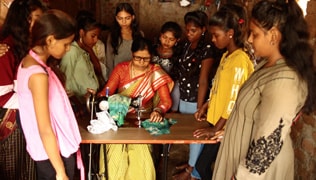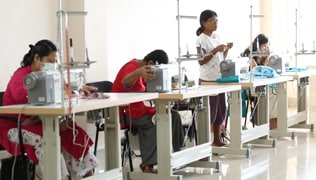- Home/
- Stories
Stories
USHA Partners With Educational Institutions To Help Women Fulfil Their Dreams Through Skill Development
Written by Barkha Mathur | Tuesday January 05, 2021With an aim to help students and women in Kashmir and Punjab fulfil their dream of a better future, USHA has collaborated with educational institutions for setting up new Silai Schools
- Written by Barkha Mathur | Thursday December 24, 2020
In the current season of Kushalta Ke Kadam, autonomous government bodies like the Central Reserve Police Force (CRPF) and the Small Industries Development Bank of India (SIDBI) partnered with USHA Silai Schools to provide skill development and livelihood opportunities to women
- Written by Barkha Mathur | Wednesday December 23, 2020
USHA SIlai School initiative, in partnership with state governments of Meghalaya and West Bengal, is empowering women by helping them learn various techniques of stitching
- Written by Barkha Mathur | Friday December 11, 2020
By turning adversity into an opportunity, 36-year-old Preeti Khushwaha took charge of her destiny and is now looking to help other women to become financially independent
- Written by Barkha Mathur | Friday December 04, 2020
The USHA Silai School and SIDBI (Small Industries Development Bank of India) partnership is proving to be a game changer on the ground, empowering women to take control of their lives and destinies
- Written by Barkha Mathur | Tuesday December 08, 2020
Here is how USHA Silai Schools has been supporting those in need amid COVID-19 pandemic and the livelihood loss caused by it
- Written by Aastha Ahuja | Wednesday June 26, 2019
While in Meghalaya, USHA taught women to stitch cloth and jute bags, an alternative to single-use plastic bags, in Delhi, visually impaired people were taught to stitch for a better livelihood
- Several Public And Private Firms Show Their Support To Take The USHA Silai School Initiative ForwardWritten by Aishwarya Upadhyay | Wednesday June 26, 2019
With the aim to empower women from marginalised communities, USHA Silai School has partnered with public and private sectors companies like Wildlife Institute of India (WII), Northern Coalfields Limited (NCL) and North Eastern Electric Power Corporation Limited (NEEPCO)
- Written by Aishwarya Upadhyay | Wednesday June 12, 2019
USHA Silai School takes their training in the north and northeastern states beyond mainstream by providing mechanical training wherein, the women learn to repair sewing machines, traditionally considered as a man's job
- With 3,500 New Silai Schools In The State, USHA And West Bengal Government Uplift Thousands Of WomenWritten by Aishwarya Upadhyay | Monday May 06, 2019
With the common goal of empowering women at the bottom of the pyramid, in 2018 USHA and the West Bengal government collaborated on training stitching to 3,500 women from marginalised communities, by opening another 3,500 training schools in the state, as requested by the state government
Adopt a Silai School
About the Initiative

Kushalta Ke Kadam, an initiative by USHA Silai School and NDTV has entered its eighth season. The aim is to empower more women across rural India by teaching them sewing skills and helping them open new doors of opportunities for themselves. The initiative encourages rural women to become financially independent and entrepreneurs by taking up sewing and training others in their respective communities.
Since 2011, the USHA Silai School initiative has trained more than 12 lakh rural women through over 33,000 Silai schools, spanning over 20,751 villages across India.
The women earn Rs. 4,000 – 5,000 per month on an average, with the highest recorded monthly earning being Rs. 84,000 in a month. This earning works as a catalyst towards building their self-confidence, reducing gender inequities, and raising their stature within their families and in society at large.
In Pics

Rebari girls grow up learning traditional embroidery, which along with their new found sewing skills developed at Usha Silai Schools, is helping them earn a living.

Usha Silai School has empowered many rural women to support their family and send their children to school.

The Usha Silai School, established in a small nondescript village that goes by the name of Kottai, is helping empower people from varied communities.

The all-inclusive Usha Silai School Programme covers the entire nation from hamlets tucked between hills to villages cast by the sea.

Vegetables farmers from the Mizoram hills earn very little given the topography of the area. Usha Silai Schools have played an important part in this region by skilling women to financially contribute towards their households.

Usha Silai School learner Lucy has trained seven other women in her community, helping them to become financially independent.

Women like Kaviben from the nomadic Rebari community are finally laying down their roots as they begin to gain financial independence and thereby stability through Usha Silai School.

Usha Silai School, located in the Gujarat's Bhuj village, is enabling rural women to earn as much as Rs. 2,500-4,000 each month.

Usha Silai School, in association with a Gujarat based NGO called Kala Raksha, is trying to bring about a Silai revolution in Bhuj.

Besides training other women from their community, many Usha Silai School learners have become entrepreneurs in their own right.

With sewing becoming easily accessible and lucrative, the silai schools are also helping revive traditional motifs and designs.












